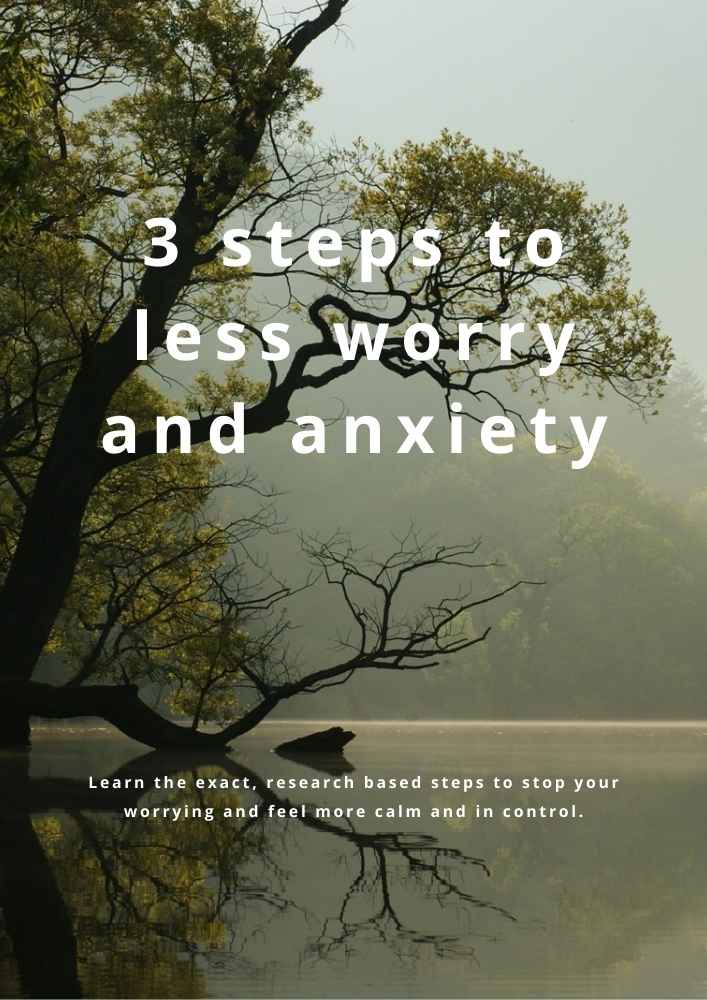Fusion beliefs and OCD: How they inform thoughts, behaviors, and rituals

Download our best tips on reducing anxiety and worrying
Learn three powerful metacognitive therapy steps to stop the worry cycle, reduce anxiety, and feel calmer in everyday life.
.jpeg)
.jpeg)
Fusion beliefs are the mistaken idea that certain thoughts are intertwined with actions or outcomes. This can lead to someone feeling as if their thoughts have power or significance, and that their thoughts can potentially cause harm.
Fusion beliefs are a key concept in metacognitive therapy, and they're central to OCD, where they (together with beliefs about the helpfulness of rituals) influence how people understand and react to intrusive thoughts.
Although fusion beliefs can sound strange at first, many of us have similar beliefs that lead us to treat certain objects, routines, or thoughts as important. For example, most people would not want to imagine an accident happening to a loved one, and some might feel like thinking about it could bring bad luck, making an accident more likely. (This is a common example of 'magical thinking'.)
There are 3 main groups of fusion beliefs:
1. Thought-Action Fusion (TAF)
The belief that having a thought could lead you to act on it. For example, a person might think, “If I have a thought of harming my child, this means I might actually do it.” This belief can lead to a lot of distress, as it creates a sense of responsibility for thoughts that don’t truly reflect one’s intentions.
Another example could be a person who has sexual thoughts about someone other than their partner. They might feel incredibly anxious, and wonder if having this thought means they will actually cheat on their partner, or that they want to cheat and don't really love them. This can lead to unnecessary guilt and worry about their loyalty, even though the thought was just an intrusive, passing idea.

Download our best tips on reducing anxiety and worrying
Learn three powerful metacognitive therapy steps to stop the worry cycle, reduce anxiety, and feel calmer in everyday life.
2. Thought-Event Fusion (TEF)
This is the belief that having a thought could lead to an outcome or event, or mean that the event must have happened.
For example, “Having a thought of my family dying in a car crash means it's more likely to occur.” This can lead to excessive worry and an attempt to avoid certain thoughts to prevent the feared outcomes.
Another example is someone who questions if they left the stove on, and goes back to check again and again, even if they know they've already checked, because they believe the thought could mean the stove is still on, and they believe checking will help them achieve a feeling of calm.
Thought event fusion can also be related to the past, and topics such as cheating, hitting someone while driving, or sending a horrible email to your boss. They may believe: 'Having the thought means it must have/could have happened, even if I don't remember it.'
This belief often leads to reassurance-seeking (repeatedly asking others for validation that it did not happen) and excessive checking (googling if anyone was hit by a car, driving back to check, checking social media and messages for signs of cheating).
3. Thought-Object Fusion (TOF)
Lastly, there’s Thought-Object Fusion (TOF), where people believe that thoughts or feelings can be passed onto objects or between people. For example, someone might think, “If I have a negative thought while touching a certain item, that item is now contaminated with negative energy.” This can result in compulsive behaviors like cleaning, tapping objects a certain amount of times, hoarding, or avoiding contact with certain objects.
If someone believes that touching a doorknob while thinking about a bad memory can attach the memory to the doorknob , they might avoid touching that doorknob again. Or they may even feel the need to wash it obsessively to 'cleanse' it of the negative connection, fearing that touching it could cause the memory to 'stick' permanently.
If someone with this belief accidentally brushes against a person on a busy street and gets a bad feeling, they might think the bad feeling was passed over from the other person, and that they have to touch that person again to transfer the energy back.
Understanding OCD rituals
Beliefs about rituals are a significant aspect of metacognitive beliefs, particularly in the context of obsessive-compulsive disorder (OCD). These beliefs are what drive people to engage in certain rituals or behaviors in response to intrusive thoughts. Someone might believe that if they don't perform their rituals, something bad will happen, or if they don't wash their hands a specific number of times, their anxious feelings won't go away.
For these people, rituals may seem to provide a sense of security or control. (Thinking 'safe thoughts' will prevent them from causing harm, or checking that the door is locked again will help them feel safe.) This belief can lead to compulsive behaviors that are intended to control the perceived dangers associated with their intrusive thoughts. In therapy, addressing beliefs about rituals is pivotal.
Fusion Beliefs and Metacognitive Therapy
Fusion beliefs are activated in response to intrusive thoughts, and these beliefs cause people to assess their thoughts as dangerous or significant. This can result in a cycle of worry and compulsive behaviors, such as rituals to neutralize or control the perceived threat posed by their thoughts.
Understanding these beliefs is crucial for therapeutic approaches like metacognitive therapy, which aims to challenge and modify such beliefs to reduce symptoms of OCD. An MCT therapist might work with a client to help them discover that thoughts are simply thoughts, and that they don't hold special power. This is typically done through dialogue and experiments, for example: The therapist and patient can try to make things happen just by thinking about them, or try to figure out which card in a deck has been tainted by negative energy.
A key question to shift the patient's perspective from being on the specific content level (will I harm my family? Is the stove turned off?) to the meta level is: 'If you didn't believe this thought was important or significant in any way, would you still have an actual problem?' Most people answer no to this.
Again, the thoughts are not the problem — the problem is the beliefs we hold about them and how we respond to them.
If you'd like to learn more about why some people develop OCD, this article is a great place to start. If you're struggling with OCD, know that you are not alone, and an MCT-certified therapist can help you find solutions to take back control of your life and release control of your thoughts.



